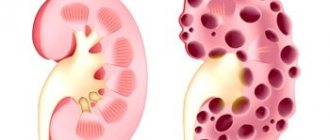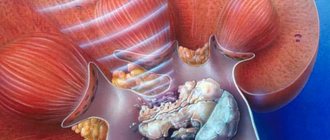In patients who have suffered from kidney disease for a long time, chronic renal failure (CRF) gradually develops. This is a severe painful condition that is characterized by the inability of the kidneys to function as a filter in the human body. Unfortunately, chronic renal failure cannot be completely cured, but modern medicine has methods to stop the development. A patient with chronic renal failure is forced to constantly be monitored by a nephrologist and undergo courses of therapy.
HPN: What is this?
The diagnosis of chronic renal failure is made to a patient who has had kidney dysfunction for more than 3 months. As pathology develops, the kidneys lose their ability to eliminate toxins from the human body, resulting in intoxication. The lack of qualified assistance leads to disruption of the natural chemical balance of the body and death. Often, chronic renal failure is a consequence of untreated ailments and inflammation of the urinary system, surgical interventions or injuries.
Other signs of kidney failure
Let's consider the remaining symptoms of chronic renal failure, which occur in most cases:
- Problems with the nervous system. The patient falls into a state of apathy, sleep deteriorates, and inexplicable fatigue is observed even during the daytime. The person becomes inattentive, and memory deteriorates significantly. The level of learning and perception of information is reduced to a minimum.
- Nitrogen imbalance. It occurs when the kidney filtration rate is 40 ml/min or less. The level of uric acid in the blood and creatinine rises, resulting in bad breath and joint damage.
- Urinary excretion. There is one peculiarity here. In the initial stages of the disease, the volume of urine excreted increases, but as the condition worsens, the patient goes to the toilet less and less. This is associated with significant disturbances in the body and the appearance of edema. In rare and most severe cases, complete anuria is observed.
- Water-salt balance. Everyone knows that this ratio plays a vital role in the functioning of the body. Failures in the system lead to disruption of the heart, and sometimes to cardiac arrest. The patient constantly feels thirsty, with a sharp rise the head becomes dizzy and darkening occurs in the eyes. It becomes difficult for a person to breathe, and muscle paralysis increases.
Pathogenesis of the disease and causes of occurrence
In nephrology, the wording of chronic kidney disease has been replaced by “chronic kidney disease.” The pathogenesis of CKD is expressed in the progressive death of nephrons (working units of the kidney), followed by replacement of the renal parenchyma with connective tissue. As a result, the organ cannot cope with filtering and excretory functions, and toxic substances accumulate in the body. The leader among the causes of this pathology is acute renal failure. Any inflammatory process in the urinary system can lead to organ failure. Etiology of the disease:
Liver cirrhosis may be a risk factor for the development of kidney pathology.
- obesity;
- urolithiasis disease;
- diabetes;
- cirrhosis of the liver;
- congenital features of the development of the urinary system;
- alcohol and drug poisoning;
- chemical intoxication;
- diseases of the cardiovascular system;
- systemic autoimmune diseases;
- various kidney diseases.
Kidney transplant
An extreme measure and extremely expensive, which only a few resort to. This is a radical solution that turns out to be truly effective. There is a risk that the new organ will not take root and will be rejected, so it is rarely transplanted.
Don't forget about preventative measures as well. Give up bad habits that adversely affect the condition of the body in general and the kidneys in particular, adjust your diet once and for all so that there is no relapse and no complications arise. Be regularly examined by a urologist so that in case of an exacerbation, you can react in time and take appropriate measures.
Symptoms of the pathological condition
CRF and CKD always act as a complication as a result of another disease. If you notice one or more symptoms, the patient should immediately consult a doctor.
The onset of chronic renal failure is not characterized by the presence of symptoms. Often the patient learns about the disease when it has reached stage 2 and kidney function is noticeably impaired. The only specific symptom of the pathology is disturbances in urine output. The patient suffers from frequent urination, sometimes at night. As the disease progresses, urine production, on the contrary, decreases, which indicates a worsening of the disease. Symptoms of chronic renal failure:
A symptom of the disease may be morning swelling of the face.
- digestive disorders;
- dry mouth;
- a sharp decrease in the body's protective functions;
- skin hemorrhages;
- nephrogenic anemia;
- albuminuria;
- swelling of the face, especially in the morning;
- muscle twitching;
- increased fatigue;
- lack of appetite.
Forecast
When such a serious illness is discovered, the question naturally arises of how long people live with it. The answer is simple: it all depends on at what stage of development of the disease it is detected. If it was possible to stop the disorders in the early stages, then the patient will live happily ever after.
But in cases where the patient ignores obvious symptoms and seeks help only in the later stages, there is less chance of further life. The fourth stage in most cases ends with immediate death.
The transition from stage to stage is quite slow, but the specific period depends on the characteristics of the human body. It takes approximately 3 months from the onset of the first chronic renal failure to death.
All cases are considered individually, and forecasts are made individually for each. Every little detail plays a role: age, health status, the presence of other pathologies. The worst-case scenario is a person’s gradual decline, disability, and then death.
For a faster recovery and a longer life, it is important to follow all the doctor’s recommendations.
Self-discipline and following the established course are 90% of success in treatment. From time to time, the doctor checks the dynamics of recovery, and if the patient fulfills all the instructions, then he manages to win the battle with the disease.
Classification of the disease depending on the stage
There is a classification of chronic kidney disease that divides the development of the disease into stages. The stage is determined by measuring the glomerular blood filtration rate (GFR) and creatinine in the blood. Knowing the degree of development of the disease helps the nephrologist select effective treatment and make a prognosis for the future. The table shows the stages of chronic renal failure and the manifestations of each of them.
| Name | GFR ml/min | Creatinine level mmol/l | Clinical symptoms |
| Hidden | >90 | 0, 123 | None |
| Latent | 90—69 | 0, 123—0,176 | Indicators are the norm for older people |
| Proteinuria appears in young people | |||
| Compensated | 60—30 | 0, 177—0, 352 | Increased fatigue |
| Anemia | |||
| Muscle weakness | |||
| Dry mouth | |||
| Intermittent | 30—15 | 0, 353—0, 528 | Increased blood pressure |
| Increased urge to urinate | |||
| Severe anemia | |||
| Swelling | |||
| Terminal | <15 | >0, 528 | The nervous system is affected |
| Symptoms of body intoxication are observed | |||
| Heart failure develops |
End-stage kidney damage in chronic renal failure
Have you been trying to cure your KIDNEYS for many years?
Head of the Institute of Nephrology: “You will be amazed at how easy it is to heal your kidneys just by taking it every day...
Read more "
The pathology of chronic renal failure is a symptom complex formed as a result of primary or secondary kidney diseases. CRF leads to the death of nephrons and the appearance of tissue sclerosis. End-stage renal failure is a general condition of the human body where there is a complete loss of kidney function, leading to excessive accumulation of toxic substances in the body, such as creatinine and urea. In the process of terminal chronic renal failure, various complicating effects develop that negatively affect the general condition of the patient (pericarditis, anemia, gastroenterocolitis). In this article we will talk about the thermal stage of chronic renal failure, its symptoms, causes of formation and the degree of organ damage.
Causes of kidney pathology
Kidney failure contributes to the formation of disorders in the body, which have a negative impact on the general condition of the patient.
Kidney failure contributes to the formation of disorders in the body, which have a negative impact on the general condition of the patient. In end-stage renal failure, disrupted processes lead to irreversible effects and deterioration of health. This stage of pathology is the last, fifth, and occurs due to a pronounced and sharp decrease in glomerular velocity and filtration. The development of this pathology is based on incorrect treatment, as well as the lack of possibility of stopping the disease. Almost any kidney disease can cause kidney failure. Disease provocateurs include:
- Autoimmune pathologies. The organ can suffer from completely different diseases, for example, vasculitis or lupus erythematosus. These diseases cause disruption and failure of the immune system, resulting in complete suppression of healthy cells. There is also a type of autoimmune pathology - autoimmune glomerulonephritis, which leads to the formation of chronic renal failure.
- Hypertension. With sudden jumps in blood pressure, the load on the organ and on all the vessels of the body rapidly increases, as a result of which the functionality and filtration of the kidneys decreases. During a period of continuous and severe hypertension, damage to the renal system and organ occurs.
- Glomerulonephritis. This concept includes a whole complex of various diseases of the organ, the main morphology of which is inflammation of the glomeruli. In severe cases of pathology, complete damage to the kidneys is possible due to stagnation of urine and ingress of blood.
- Pyelonephritis. Kidney pathology caused by inflammatory processes and bacterial infections. With incorrect therapy, pyelonephritis progresses to renal failure.
- Diabetes. This disease occurs with a large deficiency of insulin, as a result of which sugar accumulates in the blood, and when released, damage occurs to the kidney tissue. Therefore, people with diabetes constantly undergo kidney diagnostics, because sooner or later this organ is significantly affected.
Signs, stages and symptoms of the terminal stage
The initial stage of the pathology is accompanied by a slight deterioration in health
End-stage renal failure is the final stage of the pathology. Renal failure has several stages of terminal form, the intensification of symptoms of which depends on its morphology.
The initial stage of the pathology is accompanied by a slight deterioration in health, because the kidneys are not severely affected and are able to function normally. Further symptoms manifest themselves in the formation of tachycardia, shortness of breath and a sharp increase in blood pressure.
The final stage is accompanied by a lack of urination and tissue swelling, and signs of intoxication of the body appear. Kidney failure usually appears gradually with the following symptoms:
- Encelopathy manifests itself in the form of memory impairment, lack of concentration, insomnia, mood swings, headaches and apathy;
- Problems with the gastrointestinal tract. They manifest themselves in severe diarrhea, the kidneys stop excreting urine, resulting in the accumulation of toxic substances that poison the body. The patient may have frequent bowel movements, the feces have a rich color and a pungent odor. Appetite decreases;
- Swelling - is formed due to the fact that the organs are not able to remove fluid normally, which causes fluid to accumulate in the tissues and swelling of the extremities is formed; puffiness of the face can also be observed, the tongue increases in size;
- Chronic renal failure occurs as a disorder of the nervous system, the patient is unable to control his mood swings, becomes irritable, depressed, and agitated;
- Anuria is an absolute cessation of urination or the release of a small amount of urine (50 ml per day), nausea, vomiting, dry mouth appear, and the general condition deteriorates sharply;
- Oliguria manifests itself in a sharp decrease in the volume of urine excreted, often oliguria turns into anuria.
Complications and prognosis
One of the complications is uremia, in which intoxication occurs with breakdown products of various substances inside the body.
End-stage renal failure is the final stage of the pathology. During this period, all complications appear, chronic diseases worsen, the patient’s general condition deteriorates sharply and death may occur. One of the complications is uremia, in which intoxication occurs with breakdown products of various substances inside the body. The advanced stage of uremia leads to problems of the cardiovascular system, damage to the respiratory system and death of the patient.
The heart also suffers from a terminal form of pathology; as a result of its damage, the following may occur: heart attack, heart failure, cardiac arrhythmia and inflammation of the heart muscle.
In addition to kidney damage, the gastrointestinal tract is also negatively affected, resulting in: gastritis of any form, ulcers, chronic intestinal diseases and diarrhea. Therefore, in medical practice, the hemodialysis procedure is used, with the help of which the body is maintained, the performance of all systems is maintained and the patient’s life is extended. However, hemodialysis can cause hypertension, anemia, bone fragility and impaired intestinal absorption of calcium.
The terminal stage of the pathology does not give a good prognosis for the patient, even if you follow all the recommendations of the attending physician and constantly carry out the hemodialysis procedure, you can only prolong life by a few years. Often, a patient’s life can be saved by transplanting a healthy organ, but this transplant operation is only possible if the pathology has not yet managed to destroy and disrupt all body systems. It is worth noting that searching for a donor is a rather lengthy procedure, so most often experts offer relatives to become a donor.
A successfully performed transplantation operation of a healthy organ cannot give an unambiguously good result, because... the organ must take root, and for this it is necessary to carry out certain preventive measures in the postoperative period. If transplantation is not possible, continuous hemodialysis is prescribed; this procedure can alleviate the patient’s condition and prolong his life by no more than 15 years, provided there are no complications of the disease.
A steadily progressing condition characterized by disruption of adequate kidney function is chronic renal failure; treatment is required.
The disease is determined by the following symptom complexes:
- uremia;
- violation of water-salt and acid-base balance;
- persistent increase in blood pressure.
Over time, an increasing number of nephrons die off, as well as a violation of their functional state. Chronic kidney disease is the cause of a secondary shrinkage of the kidney and its complete inability to work.
Etiology of the disease
Common causes of kidney failure are:
- inflammatory kidney diseases – glomerulonephritis, pyelonephritis, interstitial nephritis;
- autoimmune collagenoses – systemic lupus erythematosus;
- systemic vasculitis, rheumatoid arthritis, scleroderma;
- metabolic diseases - gout, diabetic nephropathy, hyperparathyroidism.
Renal failure can be caused by urological diseases characterized by obstruction of the urinary tract:
- prostate hypertrophy;
- urolithiasis disease;
- various tumors;
- strictures of the bladder neck, urethra.
Chronic renal failure may develop against the background of hypertension and atherosclerosis, which lead to angiogenic nephrosclerosis. Insufficiency may appear due to congenital anomalies of the urinary system - polycystic disease, renal hypoplasia, ureteral anomalies.
Classification of chronic renal failure
The following types of disease exist:
- Latent. There are practically no changes at this stage. Glomerular filtration rate (GFR) is reduced to 50-60 ml/min. Proteinuria may be observed. In a biochemical blood test, the levels of urea and creatinine are normal.
- Compensated stage. Characterized by the severity of proteinuria. The levels of renal markers in the biochemical blood test are at the upper limit of normal. A decrease in tubular reabsorption causes polyuria - the daily amount of urine increases to 2-2.5 liters. GFR decreases to 30 ml/min. The density of urine decreases - hyposthenuria. Increased loss of Na occurs, causing electrolyte balance to be disrupted.
- The intermittent stage of chronic renal failure occurs with a further decrease in the nephron population. GFR falls below 25 ml/min. In a biochemical blood test, the content of residual nitrogen, urea and creatinine increases noticeably, and electrolyte disturbances occur, leading to metabolic acidosis. The condition of patients may periodically deteriorate with exacerbations of the underlying disease leading to chronic renal failure.
- End-stage chronic renal failure. It is the latter, characterized by manifestations of pronounced uremia. GFR is below 15 ml/min. The electrolyte balance and metabolic processes are sharply disrupted. The level of creatinine and urea rises in the blood. Metabolic acidosis occurs.
Depending on the stage of chronic renal failure, these types are distinguished.
The folk way to cleanse the kidneys! Our grandmothers were treated using this recipe...
Cleaning your kidneys is easy! You need to add it during meals...
Pathogenesis of the disease
A decrease in the number of normally functioning nephrons leads to a decrease in glomerular filtration in all of them. This is accompanied by the accumulation of harmful metabolites and a decrease in other beneficial substances. The disease leads to a lack of balance; the kidneys are not able to maintain homeostasis - the constancy of the internal environment of the body. What is the pathogenesis of chronic renal failure?
The accumulation of harmful metabolic products leads to certain symptoms characteristic of chronic renal failure. For example, an excess of guanidine compounds (substances containing an amino group with a low molecular weight) causes the following symptoms of chronic renal failure:
- general weakness;
- nausea;
- vomiting;
- refusal to eat;
- headache;
- decreased absorption of calcium in the intestine, which leads to disturbances in the primary stage of hemostasis.
Nitrogen-containing substances with an average weight, most often represented by hormones such as insulin, glucagon, parathyroid hormone, somatostatin, luteinizing hormone, prolactin, cause many manifestations.
This includes a decrease in cells in the bone marrow, the development and progression of polyneuropathy, a decrease in the body’s defenses, and a negative effect on metabolism. Parathyroid hormone received a second name - universal uremic toxin - due to its ability to extremely negatively affect the manifestations of uremia.
Emerging hyperinsulinism and secondary hyperparathyroidism lead to the development of metabolic syndrome X and increase the atherogenicity index.
In chronic renal failure, the transmembrane ordered flow of ions is also disrupted. This leads to an increase in intracellular sodium and a decrease in intracellular potassium. As a result, the transcellular electrical potential decreases, and osmotic hyperhydration of the cells occurs. Because of this, ATP activity decreases, which leads to functional disorders of various cells. Red blood cells and neurons of the brain are especially sensitive to such disturbances.
Shifts in the electrolyte balance that occur during kidney pathology lead to the accumulation of water and sodium ions in the body - overhydration - and arterial hypertension.
Clinical manifestations of chronic renal failure
The initial manifestations of the disease include:
- anorexia;
- dry skin and mucous membranes;
- unpleasant taste in the mouth.
Also observed:
- general weakness;
- skin itching;
- convulsions.
The appearance of a patient with chronic renal failure changes - the skin turns pale and becomes yellowish. Skin turgor is reduced due to dryness. Arterial hypertension is observed.
In the terminal stage, the following signs of chronic kidney disease develop: swelling of the entire body - anasarca - as a result of overhydration and hyperkalemia, which can lead to cardiac arrest of the patient.
Diagnosis of the disease
The doctor should suspect the occurrence of chronic renal failure in patients who have long suffered from diseases that can cause it. In chronic renal failure, the symptoms are as follows:
- the occurrence of anemia;
- persistent increase in blood pressure;
- asthenia of the patient;
- the occurrence of polyuria.
Reliable signs of the presence of chronic renal failure in a patient are an increase in creatinine levels, a decrease in the relative density of urine and the value of GFR. On ultrasound it is possible to see the decrease in kidneys characteristic of chronic renal failure.
Treatment of chronic renal failure
The disease that led to chronic renal failure should be treated. It is worth understanding that treatment depends on the stage of chronic renal failure.
Conservative treatment slows the progression of the disease and is effective at the very beginning.
First of all, it is worth changing your diet and work schedule.
It is necessary to limit physical activity. The diet should be consistent with reduced protein intake. Drug treatment is carried out using anabolic steroids - retabolil, nerobol, lespenefril.
In the terminal stage of chronic renal failure, peritoneal or hemodialysis gives a positive result. The essence of the extracorporeal treatment method is to remove toxins from the blood plasma by passing it through a system of filters consisting of semi-permeable membranes. On average, a hemodialysis session lasts 3-5 hours. The use of modern extracorporeal blood purification systems has made it possible to extend the life of patients up to 20 years.
It is worth noting that chronic renal failure, the treatment of which is symptomatic, cannot be cured without transplantation of a donor kidney.
Features in children
Pediatric chronic kidney damage has signs:
With such an illness, the child may have a stomach ache.
- Increased amount of urine excreted. Initially, the volume increases, but at stage 3, on the contrary, anuria develops (no urine). The same condition is observed at stage 4.
- Edema. The last stages of the disease are characterized by incomplete removal of fluids; as a result, children experience swelling of the ankles or face.
- Deformation of the limbs and loss of their full sensitivity.
- Abdominal pain.
- Increased pressure.
- Ammonia smell. If the child has a terminal kidney, there is a smell of urine when exhaling.
Disability due to chronic renal failure
To receive a disability group for chronic renal failure, you need to undergo a medical commission, based on the conclusion of which a decision will be made. The patient will be considered able to work if he has one of the first three stages of the disease.
If a person is diagnosed with terminal stage chronic renal failure with significant impairment of internal organs, then he is assigned a second disability group. The ability to work and take care of oneself in everyday life is preserved.
In this article, we talked a lot about chronic renal failure: what it is, why the disease occurs, what symptoms appear and how to cure the pathology. Health cannot be bought with money, so do not be lazy to undergo a comprehensive medical examination every six months. Remember that the earlier the disease is detected, the easier it will be to cope with it.
Dangerous consequences and complications
The consequences of CKD are the following pathologies:
- bone fragility;
- diseases of the cardiovascular system;
- chronic adrenal insufficiency;
- reproductive dysfunction in women;
- angiopathy;
- dysfunction of blood clotting and hematopoiesis;
- ulcers, gastritis and other diseases of the gastrointestinal tract;
- decreased libido;
- nephrotic syndrome in pregnant women;
- uremic coma;
- death.
Chronic form
Chronic renal failure (CRF) is a steady deterioration in kidney function due to the death of tissue, which is replaced by connective tissue. The organ shrinks and completely loses its functionality. Chronic renal failure syndrome affects up to 500 people out of every million men and women, and the number of cases is growing every year.
Reasons for appearance
Chronic renal failure develops as a result of various pathologies with concomitant damage to the glomeruli, among them:
- chronic kidney diseases;
- metabolic disorders;
- congenital kidney anomalies;
- rheumatic diseases;
- vascular diseases;
- pathologies leading to difficulty in the outflow of urine.
Often, chronic renal failure syndrome appears against the background of chronic pyelonephritis and glomerulonephritis, diabetes mellitus and gout. The hereditary factor has a significant influence on the development of the disease.
Among the rheumatic diseases that provoke chronic renal failure syndrome are lupus erythematosus and scleroderma, and among vascular diseases - arterial hypertension. Often, chronic renal failure develops as a consequence of kidney stones, hydronephrosis and tumors, due to which the urinary tract is compressed.
Symptoms
Signs of renal failure when it becomes chronic become pronounced, so it is not difficult to identify the disease.
Chronic renal failure occurs in 4 stages:
- Latent.
- Compensated.
- Intermittent.
- Terminal.
Depending on the degree of the disease, symptoms are expressed stronger or weaker, which affects treatment. Initially, a person experiences weakness and dry mouth.
At stage II, these signs intensify. Chronic renal failure syndrome, when compensated, is accompanied by an increase in urine output to 2.5 liters per day, while tests show deviations in the chemical composition of biological fluids.
In the intermittent stage, chronic renal failure is characterized by even greater inhibition of organ function. A consistently elevated level of nitrogenous metabolic products of protein, urea and creatinine is detected in the blood. Chronic renal failure syndrome leads to severe fatigue and nausea with vomiting. The patient experiences constant thirst and dry mouth, and loses his appetite. The skin becomes flabby and dry, acquiring a jaundiced color. At the same time, muscle tone is lost, tremors (involuntary vibrations of any part of the body) develop, and joints and bones begin to hurt less often.
When chronic renal failure syndrome reaches this stage of development, there is a sharp decrease in the body's defenses. A person's condition may periodically improve, but then it gets worse again. The patient is treated with conservative methods, at this time he is still able to work. But if you do not follow the diet, physical and emotional stress, the symptoms worsen. Surgery may be required.
With the onset of the final stage, people's general condition worsens. Apathy is replaced by excitement, problems with night sleep arise, retardation of movements and inappropriate behavior appear. A person’s appearance changes: the face becomes puffy and gray-yellow in color, the hair becomes thinner, loses its shine, scratches remain on the skin because it is constantly itching, and dystrophy develops. The voice becomes hoarse, and the breath begins to smell of ammonia.
From the gastrointestinal tract, bloating, diarrhea, and vomiting are observed. The tongue is constantly coated, and aphthous stomatitis is observed.
Tests reveal persistently elevated concentrations of urea and creatinine in the patient’s blood, which provokes uremia. Moreover, the presence of hematuria in men may be a sign of hemophilia.
End stage chronic renal failure syndrome is also accompanied by encephalopathy with depression, memory impairment, and mood swings. Normal hormone synthesis is disrupted, resulting in impaired blood clotting and decreased immunity. The patient requires long-term treatment, and the sooner it is started, the more likely it is that surgery can be avoided.
pochkimed.ru
Diagnosis of the disease
In addition to the totality of the patient’s complaints, the nephrologist will need to examine him.
Nephrology has a wide range of diagnostic measures for timely detection of pathology. A person who suspects he has kidney problems should consult a nephrologist. The doctor will conduct an examination, listen to complaints and collect a complete medical history. The final diagnosis is established after conducting a series of studies and determining the form of chronic renal failure.
What laboratory tests are needed?
To identify the disease, the following studies are used:
- General clinical urine analysis. Determines the degree of albuminuria.
- Urine culture. Determines the level of opportunistic microorganisms.
- Blood chemistry. Displays the status of the excretory system.
- Reberg-Toreev test. Thanks to this manipulation, the doctor establishes the stage of the pathology and measures GFR.
Instrumental diagnostics
Chronic renal failure is successfully diagnosed using instrumental methods:
A more detailed picture of the disease can be obtained using ultrasound.
- Ultrasound of the abdominal and pelvic organs. The examination will show physiological changes in the organs.
- Kidney biopsy. Taking and examining tissue from the diseased organ will help the doctor determine the optimal treatment regimen.
- Electrocardiography. Controls the condition of the heart.
- Chest X-ray. Sometimes chronic kidney disease occurs due to respiratory diseases, and the procedure helps eliminate this.
Acute form
Acute renal failure (ARF) in men and women usually develops asymptomatically and manifests itself suddenly. When a person learns about the disease, kidney damage is often irreversible. This results in urinary retention. In men, this condition in most cases becomes one of the manifestations of prostate adenoma. However, this symptom may also indicate the presence of kidney stones or a bladder tumor. In this case, men experience bursting pain in the lower abdomen, and the urge to go to the toilet becomes strong and frequent. If back pain and fever are added, pyelonephritis has most likely developed.
Acute renal failure is an indication for urgent hospitalization. The patient requires serious treatment. In this case, treatment methods are determined by the causes of renal dysfunction. The modern approach involves conservative treatment, which uses drugs to relieve symptoms.
Causes
The following causes of acute renal failure are identified:
- Impaired renal hemodynamics.
- Intoxication.
- Infectious diseases.
- Pathologies of the urinary system.
- Kidney injuries and surgeries.
The prerenal form of acute renal failure causes difficulty in blood circulation as a result of blood loss and congestion. Treatment involves drugs to normalize heart rate, droppers with saline solutions to restore plasma levels, and medications to improve blood microcirculation.
The renal form of acute renal failure occurs due to pathologies of small blood vessels or medications. Acute renal failure syndrome develops as a result of poisoning with household toxins and bites of poisonous snakes. Treatment is also conservative. For glomerulonephritis and immune disorders, cytotoxic drugs and glucocorticosteroids are prescribed, and for infections - antibiotics. Signs of intoxication are relieved by plasmapheresis.
The postrenal form of the disease occurs due to difficulty in the outflow of urine. This is common in older men with an enlarged prostate gland. Surgery is often required to remove the obstruction that is blocking the normal flow of urine. Otherwise, even diuretics will not be effective.
Characteristic signs
When acute renal failure develops, symptoms may not appear for a long time. The main symptom of acute renal failure syndrome is a decrease in urine output (oliguria), up to complete cessation of urination (anuria). The patient’s health is rapidly deteriorating, and the following signs are observed:
- nausea with vomiting;
- diarrhea;
- loss of appetite;
- swelling of the hands and feet;
- lethargy;
- excited state;
- enlarged liver.
Signs may vary depending on the stage of the disease. In total, there are 4 stages of the disease.
In case of acute renal failure of the first degree, poisoning occurs with nausea, which is accompanied by intestinal pain. The patient becomes pale, feels weak and unwell.
Acute renal failure stage II is characterized by oliguria or anuria. The patient's condition worsens significantly; urea and other products of protein metabolism begin to quickly accumulate in his blood. Self-intoxication starts in the body, the person suffers from edema, diarrhea, hypertension, tachycardia. He quickly loses strength, constantly wants to sleep, and becomes lethargic.
Acute kidney failure of the third degree is marked by the beginning of recovery. Urine formation increases and the concentration function of the kidneys is restored. The functionality of the paired organ is restored.
Stage IV of acute renal failure syndrome is the recovery phase. All indicators of renal activity are normalized. However, full recovery may take a year.
Effective treatment
Based on the data obtained from the research, the doctor develops the optimal and most effective treatment regimen.
Therapy for chronic kidney disease depends on the degree of development of the disease. For stages 1 and 2, treatment with medications, nutritional correction and spa treatment are acceptable. Later manifestations of pathology require an integrated approach, since other organ systems are damaged. End-stage chronic renal failure is treated exclusively with surgical methods; the doctor’s goal is to save the patient’s life.
What medications are needed?
If the disease is caused by poison toxins, then they need to be removed with sorbents.
Medicines prescribed to patients with chronic kidney disease are aimed at treating the underlying cause of the disease. If chronic renal failure is caused by an infectious disease of the urinary system, antibacterial drugs are prescribed. Given the intoxicating nature of the disease, it is important to remove the poison from the body. Enterosorbents are used for this. Glomerulonephritis and autoimmune diseases are treated with drugs based on glucocorticosteroids. Be sure to take medications that slow down the development and transition of the pathology to the next stage.
How are symptoms treated?
Treatment of chronic renal failure is aimed at symptomatic therapy:
- Anemia. To eliminate the cause, Erythropoietin is used, a drug that stimulates the production of red blood cells.
- Blood clotting disorder. Aspirin and Ticlopedin are used for treatment.
- Arterial hypertension. The pathology is treated with ACE inhibitors.
- Water and electrolyte disturbances. Carry consequences in the form of dehydration of the body. If the water-electrolyte balance is disturbed, doctors use bicarbonates, citrates and glucose.
How important is diet?
The patient's diet must include grains.
The leading clinical recommendations for the treatment of chronic renal failure are to follow a special diet. Medical nutrition contains little protein and salt, but is high in calories. A food diary is compiled jointly with a nephrologist. The main components of the diet are vegetable fats and carbohydrates: vegetables, fruits, potatoes, cereals, fish. The amount of protein is sharply limited to relieve the load on the kidneys. If the patient experiences edema, limit salt (3-5 g per day), as it slows down the removal of fluid. Sometimes special mixtures balanced in microelements are included in the diet.
Hemodialysis: features of implementation
This is a procedure in which the patient's blood is passed through a special machine that contains a membrane that filters out anaphylotoxins such as C3A and C5A. End-stage renal failure is successfully treated with hardware blood purification. The procedure is carried out 3 times a week for 4 hours. Hemodialysis is prescribed if the patient:
- pronounced signs of intoxication;
- electrolyte imbalance, cerebral or pulmonary edema;
- blood acidification.
The procedure is contraindicated in the following cases:
- decompensated cardiovascular disease;
- acute inflammation of an infectious nature;
- mental disorders;
- metastatic oncology;
- hypotension;
- bleeding disorders.
Surgery
Surgery for chronic renal failure involves organ transplantation from a living or dead donor.
Doctors are forced to perform a kidney transplant if all other methods of preserving it have failed.
Kidney transplantation is a radical method used if end-stage renal failure has developed and therapy does not produce results. The donor is checked according to a number of criteria for compatibility, but there is always a risk of rejection of the transplanted kidney. Patients who survive such an operation are doomed to take hormones and cytostatics for life. This method helps prolong the patient's life.
Treatment with folk remedies
The relevance of using home recipes in therapy is determined only by a doctor. There are syndromes and pathologies for which home remedies are contraindicated, as they will cause complications and exacerbation of the disease. The success of herbal treatment depends on the stage of chronic kidney disease. Treatment with folk remedies includes taking various decoctions and tinctures of medicinal plants. The most common recipes:
- Pomegranate juice. Restores water-salt balance. You should drink a glass of juice in the morning and evening and 50 ml after meals. The duration of such treatment is 2 months.
- Flax decoction. Use a teaspoon of seeds per glass of boiling water, cook for 2 minutes over low heat. Infuse the resulting decoction for 2 hours. After cooling, take 100 ml three times a day.
- Laminaria algae. Sea kale is widely known for its beneficial properties. You need to eat 100 g per day.
Kidney failure during pregnancy
It is worth noting that pregnancy is always associated with a significant load on the kidneys. Accordingly, if a woman has chronic renal failure, then the process of bearing a child occurs with complications. Pregnancy aggravates the pathology, it begins to progress.
Why is this happening? The fact is that during pregnancy, renal blood flow increases, which stimulates excessive tension in the glomeruli, and as a result, some of them die. In addition, blood clots form in the capillaries due to increased functioning of the blood coagulation system.
Chronic renal failure based on creatinine can be divided into three stages: latent, stable and progressive. Before having a child, you need to check with all doctors, including a nephrologist. If a woman has creatinine at a stable or progressive level, then pregnancy should be postponed.
During pregnancy, a woman’s body works with redoubled force, and the load on the kidneys increases significantly. In case of severe diseases of the paired organ, constant medical supervision is required. One of these pathologies is glomerulonephritis, in which the renal glomerulus suffers, normal filtration and removal of metabolic products from the body are disrupted.
- Causes
- Symptoms
- Diagnostic methods
- Possible complications
- Pregnancy and childbirth with CGN
- Therapy
- Prevention
If glomerulonephritis is suffered before conception (at least 10 months), there is no threat to the expectant mother and baby. If a latent form of pathology is present, the risk to the fetus is minimal. In the acute course of glomerulonephritis, a serious danger arises for the pregnant woman; often this disease becomes the cause of the death of the child.
Even a physiologically occurring pregnancy significantly increases the load on the kidneys. In chronic kidney disease, pregnancy aggravates the course of the pathology and can contribute to its rapid progression. This is due to the fact that:
- during pregnancy, increased renal blood flow stimulates overstrain of the renal glomeruli and the death of some of them,
- deterioration of conditions for reabsorption of salts in the renal tubules leads to losses of high volumes of protein, which is toxic to renal tissue,
- increased functioning of the blood coagulation system contributes to the formation of small blood clots in the capillaries of the kidneys,
- worsening arterial hypertension during pregnancy contributes to glomerular necrosis.
To resolve the issue of the advisability of pregnancy for each specific patient with chronic renal failure, nephrologists and obstetricians-gynecologists are involved. In this case, it is necessary to assess the risks for the patient and the fetus and correlate them with the risks that the progression of chronic renal failure every year reduces the likelihood of a new pregnancy and its successful resolution.
Is there prevention?
A healthy lifestyle is the best preventative measure.
To prevent chronic kidney disease, you need to take the following measures:
- drink alcohol in limited quantities;
- undergo timely diagnosis of deviations;
- do not take medications without the consent of the doctor;
- lead a healthy lifestyle.









